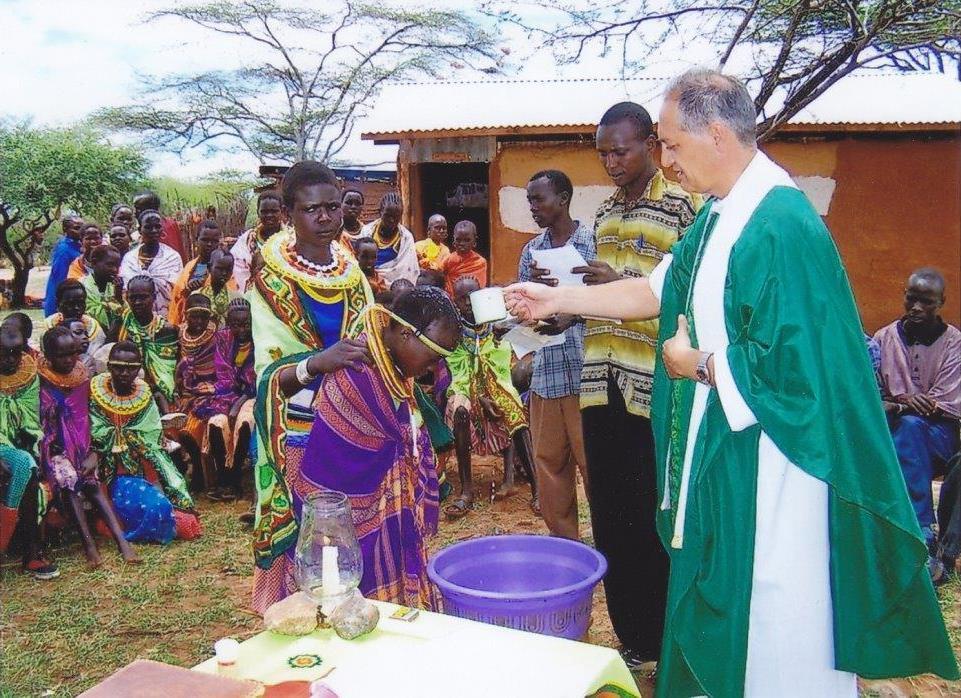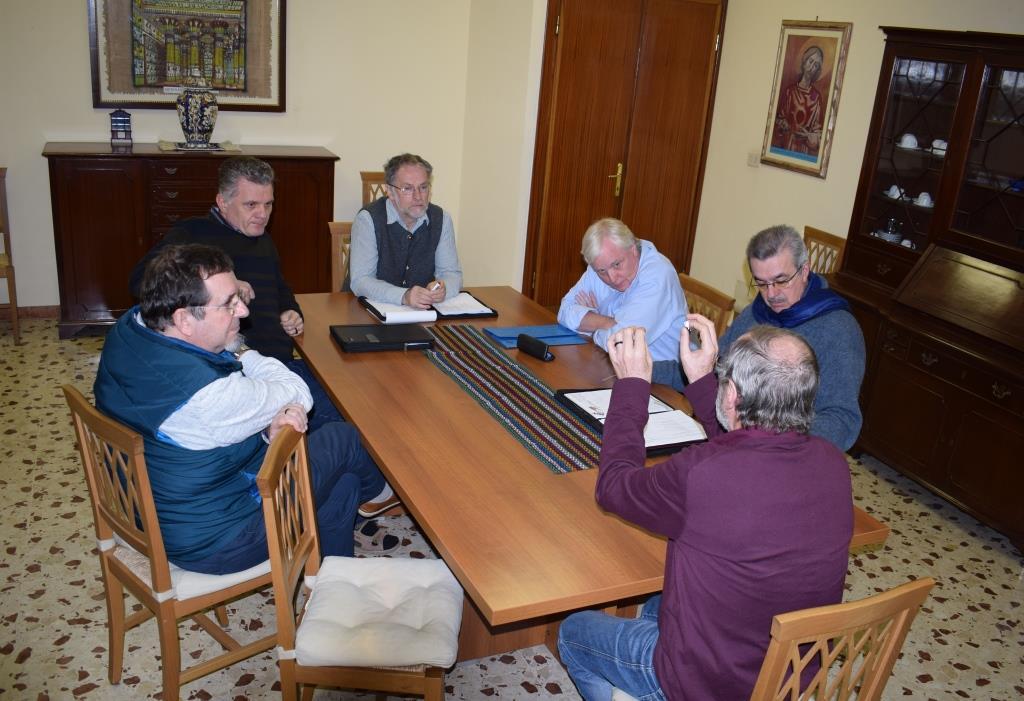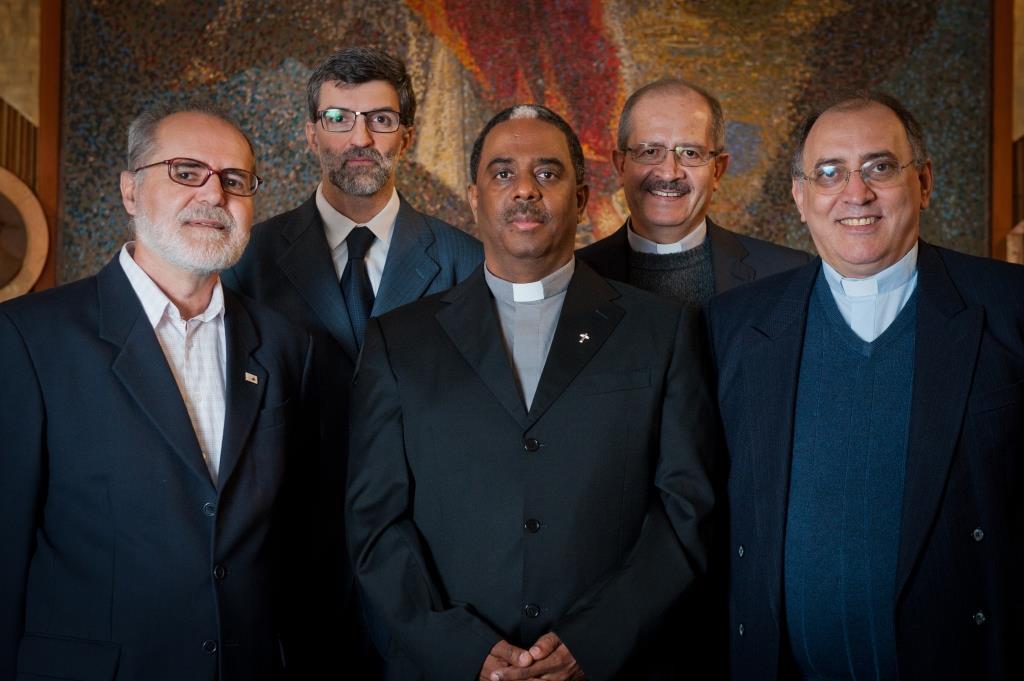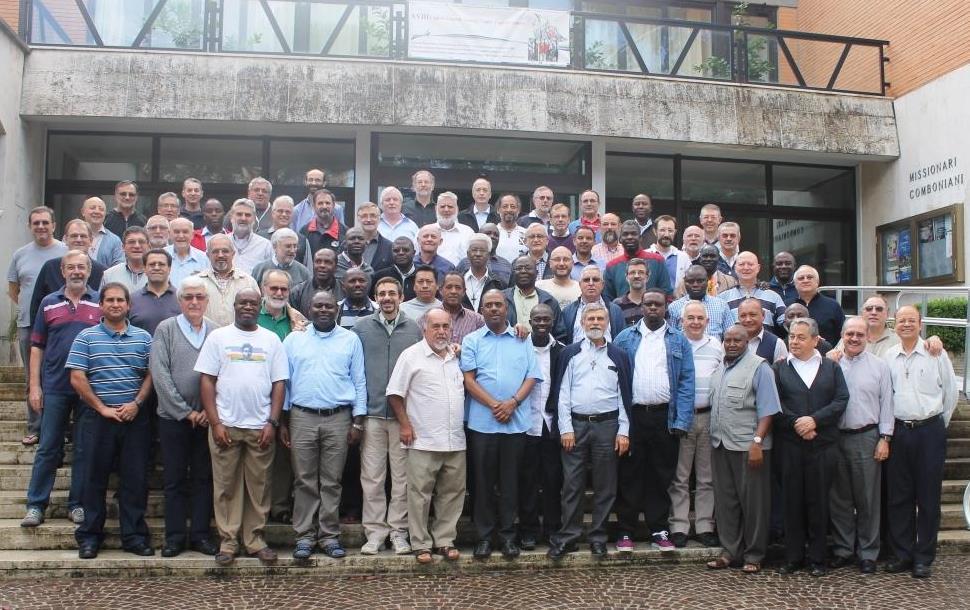Daniel Comboni
Missionários Combonianos
Área institucional
Outros links
Newsletter
Friday, September 4, 2015
“In as much as we are busy with the XVIII General Chapter, please allow me to disturb you with some commentaries on the letter ‘New Paths of Ministry among Pastoralists’, because I think that this is a way to dialogue and to build a common mind and heart, which makes us imagine to be in the Cenacle of Apostles Comboni dreamt of for his followers. They are just personal opinions with which I would like to help our confreres working among the pastoralists. May God bless you all and keep you joyful”, writes Fr. Tomás Herreros Baraja, Comboni missionary [in the picture].
Tomás Herreros Baraja,
Comboni missionary,
in Kenya.
Dots on the “ies”
on the letter
New paths of ministry
among the pastoralists
Towards the General Chapter 2015
I got the chance to read recently the brief open letter to the General Chapter of 2015 regarding our ministry as Comboni Missionaries to the so called Pastoralist People of East Africa (some months ago). The letter is a good pro-memoria for the capitulars, however I doubt it will make any difference, for reasons that I would like to explain, in the hope that my opinions may clarify the context that is implied between the lines of the letter.
Let me say that the capitulars are roughly sixty people: Of these confreres, just four provinces deal with pastoralist peoples, and the delegates to the chapter have very little experience of ministering to them. So, it will be an unrealistic on our side to expect that they take the plea of the letter to heart. The remaining circumscriptions have very little knowledge of the challenges we are facing here, in as much as we also lack knowledge of the challenges of other provinces and their areas of ministry. Little can be done to subsidize this limitation as we do not have time to read the information aired by our confreres in our magazines, bulletins and web pages. Most of us know and understand what is going on in our home provinces and the provinces we have done or are doing our ministry. And that is all.
Much of what the letter mentions can be applied to all the fields of work where the Comboni Missionaries are committed, so the letter is a kind of lobbying which will influence very little the capitulars, but that can assist the Provincial superiors and their councils in the future planning of the communities and the zones. And certainly it should assist all of us working among pastoralists. In this sense the clarifications I intend to do to the letter is not address so much to the Chapter but to the Comboni missionaries working with pastoralist people.
The ministry among pastoralists can be framed within the terminology revived by Pope Francis of evangelizing the “peripheries”, and within the terminology of our Rule of Life “poor and abandoned”. And we know that these two terms do need clarification, not only in their meaning, but above all in “the implications to us”. Let me comment some sentences first (in italics), then I will mention my own dreams.
The evangelization of pastoralist peoples is often associated with their becoming sedentary, changing lifestyle, being assimilated to other peoples and capitalist societies.
The evangelization of the pastoralists has been oriented towards the creation of Christian communities: Small Christian Communities, chapels, parishes, groups (Catholic Women, Men, Youth, Children), etc. a real challenge remains the evangelization of the family, but which kind Christian family are we talking about? And which one is relevant to the pastoralists of today? The settlement of the pastoralists has been a consequence of development efforts promoted by many agents even missionaries in order to provide education, water, health so that people could live a more humane conditions. Often the care of missionaries was the most efficient one. People have settled on their own initiative. Nonetheless, it is true that the ways our Christian communities have been organized function better with populations which are stable and settled, even slums suffer the consequences of migrations. All the same, there are challenges that pastoralist face which could find a suitable solution following the vision of the world that Christianity provides -properly sieved- such as the care of pastures, erosion, desertification, land ownership, access to water and maintenance of water points, etc. Plus, care of children, egalitarianism of women and the corrosive growth of corruption, etc. All those ill developments have nothing to do with the sedentary or movable conditions of the pastoralists.
Said that, I recognize that evangelizing sedentary people is easier than those who are on the move because they can follow time tables, calendars anniversaries elements basic in Christian religiosity. And it easier to address people who are in schools, able to understand the foreign language of missionaries, and are able to read the Bible and learn catechisms.
Efforts in the past to evangelize nomadic pastoralist failed (few pastoralists were so), why? Was it the methodology, or rather the kind of organization missionaries wanted to establish, including monogamy in marriage, and celibacy for the priests. With this I do not advocate for change, I am just trying to explain.
And what about the living conditions of the pastoralists, and most of the traditional African societies? They were not very enjoyable to foreign missionaries, neither were they very healthy. Options were taken in favour of the health of missionaries, and so prolong the efficacy of the evangelizing efforts, which had failed in previous centuries precisely because of that.
Being assimilated to other people and capitalist societies
In this sentence the criticism falls on capitalism, avoiding other “isms”. In fact for us most probably the only “ism” that we accept would be “christianism”. And even this one has much grime to be purified of. Which is the alternative? Even the so called social teaching of the church in many aspects is against the culture of the pastoralist. Their own culture and ways need to be transformed, from within though, by themselves. But who is there to determine whether the transformation is correct or not.
In these times of change every people and culture is being gulped by the so called capitalism, a neologism for “the world, or flesh of the new testament, or the Baals of the Old Testament. The danger has been always there, and the solution demands conversion. Without repentance and turning away from ways, which according to Christ are sinful, pastoralist will not obtain their best living conditions… neither will do other societies. True in some issues they are not very far from God’s Kingdom, but in others they are, otherwise our mission would not make any sense. In fact, the best antidote they can find against the evils of today’s world is found in Christ, because of that God gave him to humanity.
Pastoralists have much to contribute to society
I do think that all peoples have something to contribute to the rest of humanity And awe to those who think that their contribution is better than nobody else. However, which are the values that pastoralist people do contribute and can contribute. The news about them is that they are raiders and fighters.
As missionaries who know their living conditions and dire straights we can air the good values that sustain their societies. But before informing about them, our first duty is to know their idiosyncrasy, to walk with them in order to understand their world and the perspective from which they look on the world. How to learn about them is the challenge. In my experience, the best ways are to listen and to read, not just to look. To listen to their explanations, to have interest in their stories, traditions, language. To read what others have found before, acknowledging that the present is different from the past, but it is built on the foundation of the past. This interest is personal and cannot be imposed by a General Chapter in Rome. But, do we have the attitude of listening, the curiosity for searching, the time for learning? Right or wrong, I would have expected more attitude, curiosity and time on young confreres. Introductory brief courses to the country are just the first step on the leather, not the only one. Besides, perhaps we should also organize updating courses according to the fields where we work. We are lucky, nowadays much information is on the tip of the fingers, all it takes is to press the keyboard.
Globalization is changing communication patterns and social structures. Pastoralists need to renegotiate their identities, construct new meanings in their lives and shape their destiny in new ways.
And which society, universal church, local church, congregation does not have to do that? Including ourselves the Comboni Missionaries. Pastoralist should do that, but who is to do it? How can they do it? How can we help them to do it. Certainly it is an interesting topic for those of us working among pastoralists. However, it does not concern the general Chapter of the Comboni Missionaries. The General Chapter could start thinking on how to apply that sentence to us all.
We did try to do something on that regard during the years of reflections about Ratio Missionis. Nonetheless, some of us comment that the conclusions of the process are not touching our lives. Personally, I find the document quite inspiring, similar to the conclusions of previous Chapter; however I have not seen that Provincial Assemblies, or Zone gathering have truly consider it trying to reach concrete conclusions towards our evangelizing methodology and way of living. I hope that now that the process of the Total Common Fund has finished, we may focus on issues more transcendental to our being, rather than our consuming.
We take the Rule of Life as a kind of second Gospel, which we do not update. Our failures to implant it are on the level of sinful, that is personal mistakes, or it is because the concretization of the values that define our identity do not much with the times and the personnel of our new generations. Could we engage ourselves in a reflection of the Rule of life: how does it fit for today, how can we it to fit better, what modifications could be done? And always considering that the implementation of the Rule of Life is always contextualized.
The use of the methodology of the pastoral cycle is very useful to that end. Through its constituent components (insertion, sociocultural analysis, theological reflection and action process) it can better facilitate processes of inculturation of faith.
The Pastoral Cycle methodology is helpful in whichever circumstance or activity we find ourselves, including when we prepare our annual personal project. The official conclusions on the process of Ratio Missionis does not mention such a methodology; but since the document recognizes that it not complete, the inclusion of the methodology in the context of the pastoralist will make no harm. Much more because the environment of the pastoralist people is quite foreign to the majority of confreres working in that milieu, be of African, American, Asian or European origin. The letter hints that such a methodology would help in the inculturation of faith, a thought that deserves a small commentary, because the term is an important clue in the methodology and presence of Comboni missionaries, together with others like: insertion, community (apostolic and local), inter-culturality, lay people, local church, dialogue.
4) We want to favour respect for cultural diversity and for pluralism within the Church, according to a vibrant theology of the Local Church; to favour a pastoral approach that nurtures dialogue and that supports an abiding commitment to inculturation, together with a study of symbols, of manners and customs, of the language and the values of the people. (Our Mission… 4.4.1-4).
The document not only mentions inculturation often, but also dialogue and insertion. Elements that are important in the ministry among pastoralist peoples. The Pastoral Cycle method includes prayer in the discerning process, the prayer that is communitarian and personal. And only in as much as we are attached to the Lord that we can bring forth the loving care of the Good Shepherd (also an important element in our Comboni spirituality).
The concrete ways to evangelize the pastoralist are to be decided by the confreres in the field considering the real conditions of the people, their own capacities and the pastoral plans of dioceses, zones, provincial directories, six year plans, etc. Confreres cannot be forced onto working among pastoralists, nor onto doing this or that, but if we have the attitude of discipleship and fraternity it would be easy to accept advice and to be deployed where those in the ministry of authority tell us, be it in the provincial or communitarian level.
The pastoralist live in rough environments (and so do the people in slums). Because of that we send to those missions confreres able to cope with hardships. Our long years of formation intend to train us to be ready for hardships and discomforts. That was a peculiarity of the so called “foreign missions”. And even today to go (or to be) “ad extra” it should not mean to be tourists but rather to have the attitude of being among the people who others do not consider important, and to be “out there” where they are, not being afraid of their conditions, neither longing for the comforts of others; but assuming the identity of our people. Before western medicine proved able to cure almost any sickness, missionaries were demanded to own a strong health and will. I think this requirement is pertinent still. The diminishing numbers of young confreres bring to us the temptation of Gideon, however it is more important the excellence of the persons, though few, than the crowds. Comboni wanted missionaries “holy and capable”. Most probably we shall never be an army of missionaries but we can always remain as special units of evangelizers.
Besides all that I acknowledge that we have a vocation, that is we have been called by the Lord of the harvest, and that we have long periods of preparation for our ministry which include training for prayer, training for theology and other professional skills, training in field work, training for community living, training for collaboration with other pastoral agents. Much of that training is done in institutions which are not under our direct responsibility. We have tried to find institutions that could give a missionary nuance to the formation of our young confreres, but is it true? In as much as the preparation for priesthood is basically the same everywhere, we know that the recipients of our ministry shape the approach on how to do it. As Comboni missionaries we are recognizing very well the qualification of ministry within Islamic environment; we reserve ample time for learning Chinese; but are we acknowledging the peculiarities of the pastoralist people, of the urban slums (in Africa, Asia, North and South America), of the rural populations (in Africa, in South America).
Many theological schools do have offer masters on youth ministry, family life, spirituality, etc… very few mention missiology nowadays, and none considers slums and less the pastoralist. We cannot be jack of all trades, and since the time when we opt for scholasticates or brother centres we are tilted towards areas of our personal interest in conformity with the comboni charism and our personal skills. So, now could we become more professional and specialized? Could we assign scholasticates to type of ministry? For instance: Nairobi: Pastoralist and Urban Slums; PMB: Rural and Urban Africa; Lima: Afro and indigenous Americans and Urban Slums; Casavatore: Islam; Kinshasa: Rural non Christian Africa; Cape Coast: Islam, Slums, Urban Africa; Sao Paolo: Slums and Afro-Americans. China and migrants in Europe remain the lame duck, to be treated in a chapter apart. And we are compelled to say the same about our Bothers in the International Brother Centres.
I have mentioned something about the “ad extra” of our charism, which goes together with “inter-culturarility” and our capacity to leave our original cultural milieu and adapt ourselves to another one. Nowadays, we see more and more the people go around the world with their own habitat concentrated on computers and mobile phones, which in as much as they are a very handy tool for learning and ministry, they can be a hindrance to insertion, or integration into the peoples where we have been sent.
The conclusions of the Ratio Missionis process eventually will lead to some consequences regarding the understanding of “Ad Gentes” and the fields of work, within the peripheries of humanity and the unreached people of the gospel. The “Ad vitam” seems to imply commitment for life, yet we know that commitment can become a mere word and the length of it something relative, considering the span of life of people and the conditions of their energies.
All these three qualifications “ad extra, ad gentes and ad vitam” seem to produce goose skin in many of us and treat them as taboo for our conversations. But let me say like my mother used to tell me: “Consejos vendo que para mi no tengo” that is “Admonitions I sell, that to myself I don’t tell”.
Fr. Tomás Herreros Baraja, mccj
From left:
Comboni Lay Missionary,
Fr. Manuel Pinheiro de Carvalho,
and Fr. Tomás Herreros Baraja,
in Peru.
APENDIX
Now that the process of the total common fund has been completed, let me trace a stroke on the “tees” to the letters, as the sentence does not have “ies”.
The report of our province to the Chapter rightly considers a step ahead the achievement of the Total Common Fund. It has become an updated system for the implementation of the Rule of Life without making amendment to it (Rule of Life 28-30). A new way of living the virtue of trust in God’s providence, proposed by our consecrated life; and of following the peculiar devotion that Saint Daniel Comboni had for Saint Joseph. That updating had to be done, and there is still room for improvement, which new generations will try to do, without forgetting to be generous towards the poor and remaining faithful to a simple life style to prove that we rely more on God than on wealth, etc.
Thanks to the Total Common Fund the warning, that I read somewhere, done by confreres, about the danger of “division between those who have and those who have not” will disappear. Yet, that will not mean that conflicts will wane, in as much as they are in any ordinary family regarding the administration of goods.
My worry about the administration of goods is depicted in the following behaviours, which have been present in the past and still persist, regardless the cultural origin of confreres:
- Those who eat in the community but their donations are not brought to the community but rather are given to other organizations.
- Those who spend and those who spare.
- Those who going on holidays take three suitcases and those who go with one.
- Those who struggle to collaborate with divine Providence and those who remain idle.
- Those who work and those who linger.
- Those who bring gifts and those who prefer to give out.
Now that we have managed to distribute well our possessions, and while we learn how to get income for our maintenance and for the support (promotion) of the poor allow me to share about one last concern regarding the so called benefactors. Because if we do not treat them with tenderness they just go away and stop assisting projects, Comboni missionaries and the concrete person who deals with them. Benefactors who assist projects or missions do not like to be approached by individuals who tell them of problems of their families (parents, brothers, nephews, etc.). Whichever is their answer, their understanding is that their donations risk to be diverted. Therefore, they stop helping altogether. True that some of our families come from poor backgrounds, but our major concern suppose to be the poor living in our missions not the poor of our families. Long time ago a student of ours, worried about the school fees of his brother, asked me whether we could include him in the sponsorship programme of the mission. I told him that we could, provided that his brother would become a resident in our area, because the program did not assist Pokot only, but young people of the mission. His brother never came all that far. We are worried about our future up keeping, right, but when we go to our families with gifts for everyone, the message we give is that we are not in need, so why should they help us and the poor who surround us.
In the case of the pastoralist, the poor might not be so poor because they do own cattle in plenty, but for the use they make of it, it is like owning stones. Ignorance is a kind of poverty that surpasses economics.
It is nice to see young priests and confreres caring about the well being of their mothers, but how come that other siblings do not? The care of poor families of our confreres is something that needs to be dealt with in the TCF and in our living of our consecrated life. At present my friends diocesan priests of Spain tell me that we make the vow of poverty, but they live it. And my brothers tell me something similar, though they understand that institutional wealth is different from personal richness. All the same, recently my sister told me, “Tomas, remember when we were poor!!” We were a family of farmers with seven children; but my parents not because they did not have as many means as others did not stop from doing charity… because there is always someone else poorer. And there is no shame in being poor, when we are hard working and honest. This is what I have seen in many of our families in Africa as well. That is one of the reasons why the Lord has a preferable love towards the poor. And the best reason for us to live a simple life, not a life in plenty, and to be generous as well.
Fr. Tomás Herreros Baraja, mccj







